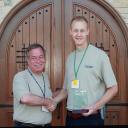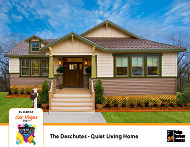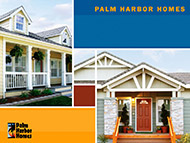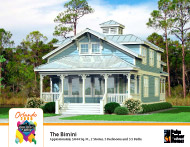 Ron Powell, President of Manufacturing, Palm Harbor Homes, Inc., talks about Palm Harbor’s commitment to strong, efficient, green modulars
Ron Powell, President of Manufacturing, Palm Harbor Homes, Inc., talks about Palm Harbor’s commitment to strong, efficient, green modulars
- Why has Palm Harbor become a leader in building strong, energy efficient modular homes?
Palm Harbor’s motivation to exceed commonly accepted standards of strength and energy efficiency comes from its foundational belief that that our homeowners deserve homes that exceed their expectations. Most people consider their mortgage, property taxes, and homeowner’s insurance to be part of the cost of home-ownership, while neglecting the very real costs of maintenance and utilities. Palm Harbor has always chosen to focus on minimizing both of these, allowing our customers to own more home than they would have been able to own otherwise. This is our value proposition to our homeowners. Palm Harbor will provide a strong, tightly built home that will save you money on energy costs and repairs so you can use that savings on what homeowners really want – more square footage or customization.
Besides being the right thing to do for our customers, a focus on strong, efficient homes is the right thing to do for the environment. Building to high levels of energy efficiency helps conserve natural resources, while building more durable homes reduces the impact of scrapped building materials on landfills.
- Why did Palm Harbor choose to partner with ENERGY STAR® in the mid 80’s?
Because Palm Harbor was already building homes to standards beyond code requirements, partnering with ENERGY STAR almost 20 years ago was a natural step. Florida’s hot, humid conditions made our Plant City, Florida, manufacturing operation the perfect location to establish how far we could go with energy efficiency and green construction. Our Division President, Mike Draper, worked with our Vice President of Engineering, Bert Kessler, to make ENERGY STAR a reality for Palm Harbor Homes. Once the process was established, it was rolled out to Palm Harbor manufacturing facilities nationwide.
Given our long-established focus on energy efficiency, Palm Harbor did not have to make major modifications to assembly lines. However, we did make some minor changes to our construction techniques to better accommodate our duct-leak test procedure, but the adjustments were minor and did not necessitate an extensive investment.
- Did Palm Harbor’s ability to customize homes for the modular market make the shift to energy efficient construction easier than for a non-custom manufactured builder?
Because Palm Harbor has always allowed customers to customize their homes, our associates were used to dealing with differences from one home to the next. For Palm Harbor, having a higher energy efficiency as a standard meant that we did not have to sell numerous upgrades. For an assembly line, this makes things easier and more efficient. Additionally, Palm Harbor’s construction as it relates to energy efficiency is standardized. Consequently, no matter what customers choose, the basic process is the same.
Recently, one of our homes received the U.S. Department of Energy’s (DOE) first Energy Smart label. This home, the Bimini out of our Plant City, Florida, building center, is rated at 57 HERS based on the Home Energy Rating System index developed by the Residential Energy Services Network (RESNET). This 57 rating means that the home is 43% more energy efficient than the typical new home built today and, at 3,644 square feet, the home has an expected average bill of less than $150 per month for electricity and gas. In contrast, an ENERGY STAR rated home has to only be 15% more efficient The home itself qualifies for National Association of Home Builders (NAHB) Green Award at the Gold Level and is expected to receive its gold certificate once the home is secured on its permanent foundation and the lot is inspected.
- Is the market for energy efficient modular homes on the rise?
Currently, it is difficult to name any market that has expanded in raw numbers. However, green building is well established as a concern for a growing segment of today’s buyers. Consumers are feeling the impact of higher energy prices as well as becoming more aware of important issues such as sustainability and conservation. Educated consumers are focusing on the fact that they can minimize the long-term cost of home ownership with a small investment in energy efficiency when they buy their home and help the environment. Recent efforts by the National Association of Home Builders (NAHB) and the Department of Energy (DOE) are aimed at increasing homebuyers’ confidence in the energy efficiency and durability of the home they are investing in by providing a national standard that homebuilders can adopt and use.
- Will we see more modular builders adopt energyefficiency and green construction as part of their building practices?
In the past, green building has been more popular in areas of the country that offered significant utility rebates to homebuyers who opted for more efficient homes, even when energy costs were lower. However, with energy prices now rising substantially, green building is being demanded across the country. As potential homebuyers continue to inquire about green building, more builders will adapt their homes to qualify for green construction, modular or otherwise.
Modular companies have a great opportunity to lead this effort. The efficiencies offered by a production line and the natural ability to minimize waste by building in a controlled environment give modular a head start toward achieving high levels of green building and energy efficiency.
Click Here to send us a question about modular construction or tell us about your next project.






